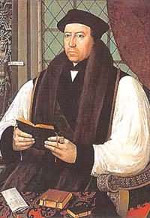Dates (1489-1556)
1489 Born at Aslockton, Nottinghamshire.
1510 Educated Jesus College, Cambridge.
1515 Receives MA; marries Joan some time after, who dies in childbirth.
1523 Ordained priest.
1529 Favored Henry VIII’s annulment of marriage to Catherine of Aragon.
1532 Secretly married Margaret Ossiander, niece of Andreas Osiander, while on embassy to Charles V.
1533 Became Archbishop of Canterbury; Henry’s marriage declared void.
1535 Coverdale Bible published (a revision of Tyndale).
1536 The Ten Articles (Mildly Catholic).
1537 Bishops’ Book (replaces the Ten Articles).
1539 Six Articles (Cranmer opposed – sent his wife back to Germany).
1540 “Preface to the Great Bible.”
1543 The King’s Book (revised version of the Bishops’ Book).
1544 The Great Litany.
1547 Death of Henry VIII.
1549 First Book of Common Prayer of Edward VI.
1552 The Ordinal; Second Prayer Book.
1553 Forty-Two Articles.
1553 Death of Edward VI, Accession of Mary Tudor.
1556 Cranmer burned at the stake.

As noted in my essay “What is Anglican Theology?,” Anglicanism does not have a distinctive founder to whom it appeals for identity in the way that Lutherans look to Martin Luther, for example, or the Reformed look to John Calvin. Even if we look to the Reformation-era for roots, the English Reformation covers the entire period from the initial Catholicism of Henry VIII, to the more distinctively Protestant era of his son Edward VI, which would be the period of Thomas Cranmer and other figures such as Hugh Latimer and Nicholas Ridley, and concludes with the Elizabethan settlement of the following generation, whose chief figures were John Jewel and Richard Hooker. Even then, one could make the case that it was really only in the following generation of the Caroline Divines that Anglicanism finally arrived at a settled identity. This extended beginning means that subsequent Anglicans have been able to appeal to different figures in this initial period as exemplars of Anglican identity, certainly Cranmer, but also Hooker or various figures among the Caroline Divines.
This essay and the next will examine themes in Thomas Cranmer’s theology. If Cranmer is not a figure of the stature of Luther or Calvin, he is nonetheless the most significant figure of the initial period of the English Reformation, not only because he was the primary author of the two first versions of the Book of Common Prayer of 1549 and 1552, but was also a major author of the 42 Articles, which later became the 39 Articles. Cranmer also wrote a number of homilies in the Book of Homilies,. These three sets of documents – the Prayer Book (and the Ordinal), the 39 Articles, and the Book of Homilies – are sometimes referred to as the Anglican Formularies, and have been appealed to (especially by Evangelical Anglicans) as definitive doctrinal sources for Anglican identity.
Because of Cranmer’s historical significance, not only as the Archbishop of Canterbury during the reign of Henry VIII and his son Edward VI, as the author of the Prayer Book, and a major contributor to the 39 Articles and numerous Homilies, the question of how to interpret his theology is not only important for Anglican theology, but also controversial. While no one would claim that Cranmer was what would later be called an Anglo-Catholic, theologians have pointed to numerous “catholic” themes in Cranmer’s theology: the modeling of the Book of Common Prayer on patristic liturgies, the medieval Sarum liturgy, and historic Catholic collects; Cranmer’s modeling of Morning and Evening Prayer on the Benedictine Daily Office; Cranmer’s regular appeal to the church fathers, and, finally, a conciliatory tone that perhaps echoes more the humanist Catholic Desiderius Erasmus than Luther or Calvin. At the same time, Evangelical Anglicans often have looked to Cranmer as a definitive authority, and have appealed to the Anglican Formularies as normative for Anglican identity. If earlier interpreters tried to recover a more “catholic” or ecumenical Cranmer, in recent decades there has been a resurgence of the more “Protestant” interpretation of Cranmer’s theology.1 In this and the following essay, I will attempt a balanced interpretation of Cranmer’s theology, to show why he can be appealed to by many different interpreters. In this chapter, I will summarize Cranmer’s Reformation theology; in the next, I will look at his sacramental theology and his liturgical contributions.





